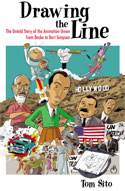|
March 7, 2013 thur March 7th, 2013 |
|
Question: Okay music lovers, who was Mathilde Wesendonck? She is part of musical history even though she did not sing or play any instrument.
Yesterdays Question answered below: Quiz: Who wrote “ I shot an arrow up into the air. It fell to earth, I know not where.”
---------------------------------------------
History for 3/7/2013
Birthdays: Maurice Ravel, Piet Mondrian, Roman Emperor Geta, Luther Burbank, Tammy Fae Baker, Willard Scott, Lynn Swann, Franco Harris, Daniel D. Travanti, Rachel Weisz is 42, Michael Eisner is 71, Wanda Sykes is 49, Peter Saarsgard is 42, Bryan Cranston is 57
322 BC- the Greek philosopher Aristotle died of indigestion.
161AD- The death of the Roman Emperor Antoninus Pius. Marcus Aurelius Antoninus became Emperor. Marcus named his brother Lucius Verus as co-emperor, but Verus died after a few years. Marcus Aurelius became famous as the philosopher-emperor, ruling justly and leaving behind his Meditations, one of the great works of western philosophy.
1274- Saint Thomas Aquinas died in Italy. Everybody knew the great teacher was so holy he undoubtedly would be made a saint (the medieval equivalent of being called to the Hall of Fame). So rather and wait for opportunity to sell his bones as relics the people sped up the process of decomposition by boiling his remains in lye.
1765- PARLIAMENT PASSES THE STAMP ACT. Ever since winning Canada and India from France, England had to come up with ways to pay for her massive war debt as well as garrisoning and administering of all the new possessions. The Stamp Act ordered that all purchases and exports to and from America have a royal stamp (i.e. tax) on them, sort of like the stamp you see on liquor bottle caps. These taxes were already in place in England, so Whitehall felt nobody would mind. Americans went ballistic and overnight became a nation of smugglers. They most strongly objected to the idea that the tax was levied without their consent. No one consulted their elected representatives and there were no American seats in Parliament.
Even though the unpopular act was repealed a year later after Benjamin Franklin successfully argued in Parliament, the resentment against the mother country lingered. The British in turn were surprised and annoyed by the all the fuss. They felt the Yankees were and ungrateful people they had defeated French and Indians for.
1774- To combat rampant smuggling and teach a lesson to the increasingly defiant New Englanders, the Royal Governor of Massachusetts General Thomas Gage ordered the Port of Boston closed. This act all but ensured that the first outbreak of violence in the American Revolution would happen there.
1809- French Balloonist Jean Pierre Blanchard died from injuries sustained from crashing his balloon in the Netherlands. Blanchard with a man named Jeffries had crossed the English Channel by air and for years he had demonstrated the wonders of air flight for audiences like Washington, Benjamin Franklin and Napoleon.
1850- THE 7TH OF MARCH SPEECH- The only address given to Congress that is known only by it's date. Senator Daniel Webster stood up and electrified the nation with a three hour address backing the Clay Compromise: "Mr. Speaker ! I rise not as a Massachusetts man, or a Northern man, but as an American !!" This Northern abolitionist backed the fugitive slave law and other concessions to the South in exchange for California entering the union as a non-slave state.
New England supporters were furious and called him a Benedict Arnold. His controversial stand probably cost him his last chance of ever becoming president and he died bitter two years later, but John F.Kennedy said in "Profiles in Courage" that by doing this act Daniel Webster helped delay the Civil War for ten more years, which allowed the north to grow more industrially powerful. So he saved the United States as we know it.
1862- THE BATTLE OF PEA RIDGE- Yankees under General Curtis defeated a Confederate army under Gen. Stirling Price, keeping Missouri in the Union. It was a confused battle with militias, frontier scouts like Wild Bill Hickock and Creek Indians under Confederate Colonel Stand Watie. Curtis directed the battle in an old brown corduroy jacket and nuzzled a shotgun in his lap. The Creeks captured a Union battery but stopped their attack to dance with the scalps of the bluecoats.
1862- BULLETHOLE ELLIS- Rebel Guerrilla leader William Quantrill and his raiders shoot up the Kansas town of Aubrey. During the raid Quantrill fired his Colt revolver at a man in a second story window named Abraham Ellis. The bullet was slowed by smashing through the windowsill and embedded in the man’s skull, but just missed touching his brain. Quantrill apologized to Ellis. Ellis had helped him get a teaching job before the war. The raiders left him for dead, but Abe Ellis recovered. Old Bullethole Ellis lived to a ripe old age, just with a large round dark hole in the center of his forehead.
1877- Bill Reed, a Union Pacific Railroad worker discovered a vast field of dinosaur fossils at Como Bluff Wyoming. "The bones extend for seven miles and are by the ton!"
1906- Finland becomes the first nation to give women the right to vote.
1916- BMW- The manufacturing firms of Karl Rapp and Gustav Otto merged to form the Bayerische Flugzeugwerke AG -Bavarian Aircraft Works. The company would later become the Bayerische Motor-Werke -Bavarian Motor Works or BMW. The Logo circle represents a white propeller turning against a blue sky- the colors of the old Kingdom of Bavaria flag, the Medieval heraldic shield of the ruling dynasty the Wittelsbachs. After the war, BMW was prohibited from manufacturing aircraft engines, as their engines had powered the fiercest fighters of the Luftwaffe, among them the Messerschmitt Bf 109 and the Focke-Wulf 190. So BMW focused on making cars.
1932-BATTLE OF THE RIVER ROUGE- At the depth of the Great Depression unemployment in Detroit was up to 50% of the population. 10,000 desperately unemployed auto workers stage a protest march on Henry Ford's Rouge River plant, the largest factory in the world. They are met by police and thugs who fired into the crowd, killing 3 and wounding 25. Henry Ford, (who personally made $10 million that year) had machine guns mounted on his home's roof and advised his chief executives to carry sidearms. Fords private in-house police were called by the Orwellian misnomer the Service Department.
1936-HITLER RE-OCCUPIED THE RHINELAND- Since the Versailles treaty the German industrial heartland of the Ruhr valley was under neutral and sometimes Anglo-French occupation. Imagine trying to restart your stagnant economy with Chicago, Detroit and Pittsburgh under foreign control. Today Hitler took the biggest gamble of his career and ordered the still infant Wehrmacht army to reoccupy the Ruhr, in defiance of all previous treaties. He dared the Allies to do something about it, and they stayed quiet. German generals were amazed that France and England could have easily invaded at any time and squashed them, but they did nothing.
1942- The Japanese army captured Rangoon and cut the Burma Road, severing Anglo- Chinese supply lines. After this supplies would have to be brought in 'Over the Hump" meaning flown by unescorted transport planes from India over the Himalayas.
1945- THE BRIDGE AT REMAGEN- A hostile army had not crossed the Rhine into Germany since Napoleon in 1806. The Germans called their defense of the border the Seigfried Line. The fleeing Nazi's had ordered all Rhine bridges destroyed but the bridge at Remagen was detonated with inferior charges. So it stayed intact as the U.S. Third Army approached. Sgt. Alex Drabik of Ohio ran across the bridge, weaving back and forth like a football fullback, with the enemy firing at him from all sides. Just as he reached the other side a Nazi popped out, pointed a Lugar pistol in his face and pulled the trigger. The gun was empty. The Siegfried Line was breached, and Sgt. Drabik died of very old age in 1993.
1947- Winston Churchill, while giving a speech in America about the Soviet dominance of Eastern Europe uses the term "Iron Curtain". " From Zagreb on the Adriatic to Stettin in the Baltic, an Iron Curtain has descended across Europe." The phrase had been invented earlier by German Admiral Doenitz, but Churchill popularized the phrase. The Iron Curtain came down in 1989.
1951- The Prime Minister of Iran- General Ali Rasmara was assassinated by Islamic extremists.
1965- THE EDMUND PETTUS BRIDGE-As Dr. Martin Luther King’s Civil Rights marchers reached the Edmund Pettus Bridge in Selma, Gov George Wallace had Alabama police ambush them with firehoses, teargas, bullwhips and attack dogs. Dozens of peaceful marchers were beaten and hospitalized. Three were killed. The brutal images on television shocked the nation had probably did more to ensure passage of the National Civil Rights Bill than anything the police could do to stop it.
1969- Golda Meir became Prime Minister of Israel.
1988- 300 pound female impersonator Harry Milstead, better known as Divine in the John Waters films, died of sleep apnea.
1999- Film director Stanley Kubrick died just five days after completing his final film Eyes Wide Shut.
------------------------------------------------------------------------------------
Yesterdays Question: Quiz: Who wrote “ I shot an arrow up into the air. It fell to earth, I know not where.”
Answer: Henry Wadsworth Longfellow’s poem, The Arrow and the Song.
I shot an arrow into the air,
It fell to earth, I knew not where;
For, so swiftly it flew, the sight
Could not follow it in its flight.

|




